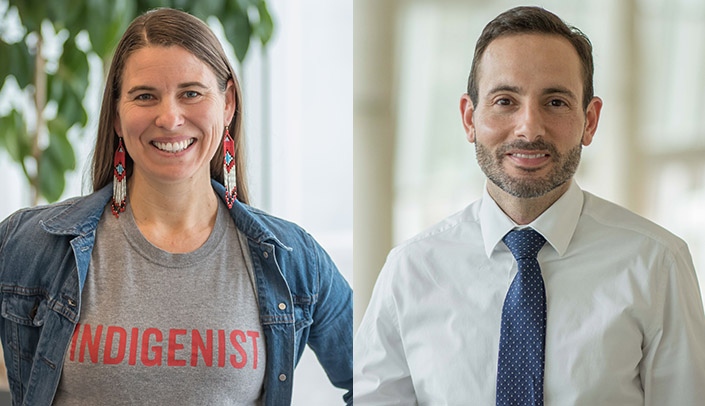Regina Idoate, Ph.D., assistant professor of health promotion in the UNMC College of Public Health and citizen of Cherokee Nation of Oklahoma, and Omar Rahman, M.D., director of the MMI Department of Genetics, have received a $50,000 grant to work with the community on the Pine Ridge Indian Reservation, the Oglala Sioux Tribe and Oglala Lakota County Schools in South Dakota to conduct a community readiness assessment.
Drs. Rahman and Idoate teamed with Lisa Spellman, UNMC media specialist and member of the Rosebud Sioux tribe, to approach tribal leaders about the project — called “RE-AIM: Readiness and Education for American Indian Maternal and Child Health” — designed to increase awareness and knowledge about prenatal health, fetal alcohol spectrum disorders (FASD) and mobilize the community to reduce the impact of FASD.
CBPR
The study will follow Community-Based Participatory Research (CBPR) principles, as well as Indigenous research methods. The nine principles of CBPR are:
- Acknowledge community as a unit of identity;
- Build on strengths and resources of the community;
- Facilitate collaborative and equitable partnerships in all phases of the research;
- Foster co-learning and capacity building among all partners;
- Integrate and achieve a balance between knowledge generation and intervention for the mutual benefit of all partners;
- Focus on the local relevance of public health problems and on ecological perspectives that attend to the multiple determinants of health;
- Involve systems development in a cyclical and iterative process;
- Disseminate results to all partners and involve them in the wider dissemination of results; and
- Involve a long-term process and commitment to sustainability.
“The effort involves interviews with community leaders and community members to assess community attitudes, knowledge, resources and activities,” Dr. Idoate said. “The community readiness model will provide us with a better understanding of community context to help us develop community-specific, culturally appropriate strategies that generate effective prevention or intervention efforts.”
The project sets the groundwork for a successful prevalence study to be conducted, Dr. Rahman said. “From there, we can begin to develop interventions that are informed by the community’s experience and insight.”
“The entire focus of this work has been to help mitigate the impact of alcohol on the children and families living in the Nebraska panhandle and on Pine Ridge,” Spellman said.
The grant is the culmination of years of outreach dating back to 2016, with a listening tour to learn about the impact of abuse of alcohol in the region, including Pine Ridge, related to the sale of beer in Whiteclay. During a follow-up trip in May 2018 to Pine Ridge, Dr. Rahman and Spellman met with teachers, families and medical professionals to discuss the effects of FASD.
Dr. Rahman established a comprehensive genetics clinic at Gordon Memorial Hospital later that year and began seeing patients via a telehealth platform that December of 2018. Dr. Rahman and Spellman returned, joined by Dr. Idoate and Diego Gomez, a neuroscience student, to meet with teachers in Gordon, Rushville and on Pine Ridge in 2019 — an effort supported by College of Public Health Dean Ali S. Khan, M.D,. M.P.H. — to discuss how to help children impacted by FASD and ways to support teachers in the classroom and provide wraparound services via the Gordon Clinic.
“The established relationships, and Dr. Idoate’s expertise in community-based participatory research (CBPR), led to the level of trust needed to put the study into place,” Dr. Rahman said.
“This study will follow CBPR principles, as well as Indigenous research methods,” Dr. Idoate said. “This project centers the relationships that guide our work-for example, in determining what data is shared, how it is shared and where it is shared, all that is done in partnership with the community.”
FASD is a complicated disorder, because there’s no test for it. But establishing a baseline for the community’s level of readiness to focus on maternal and child health and FASD could open the door to other interventions that align with the needs and desires of the Pine Ridge community, Dr. Idoate said.
Shannon Maloney, Ph.D., enrolled member of the Saint Regis Mohawk tribe and an assistant professor of maternal and child health at the College of Public Health, will take the lead on reproductive health training and contribute to the development of preconception and reproductive health focused community-based initiatives.
“The research that’s been done over the last 20 years has focused on high-frequency populations, mostly in South Africa,” Dr. Rahman said. “And in South Africa, rates of FASD have been decreasing over the past two decades, because they initiated prevalence studies around 2000, and then they began intervening, both prenatally, to inform mothers and families about alcohol exposure, and to provide adequate support and early intervention to the kids.
“So if we get a prevalence and we can understand the dynamics of the disorder in a population, we can create interventions that will improve it,” he said. “This is what we want in the long run.”
“We are in a strong position to move forward,” Dr. Idoate said. “We’re grateful for the support for this project, not only from UNMC, the funders and the researchers, but the Pine Ridge community, as well.”
“For me, this grant is personal,” Spellman said. “As a Lakota, daughter of an alcoholic, and as a mother, I know all too well the devastating impact alcohol has on our people. I also know that we are resilient. Our strength lies in our culture. And given the opportunity we thrive.”

This is awesome, Thank you to everyone involved.
A great effort by UNMC to take on a difficult issue. Should make us all proud.
Great work! Positive news about helping our community is very welcome at the moment.